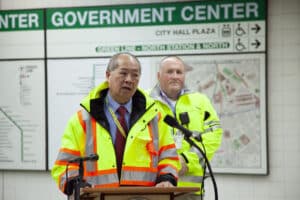
MBTA General Manager Phil Eng speaks to reporters from a podium set up on the Green Line platform at Government Center on Feb. 15, 2024. Photo by Chris Lisinski | State House News Service
When he was announced last spring as the new general manager for the much-assailed transit agency, Phil Eng declared that it was “time for a new way of doing business at the MBTA.”
In a wide-ranging conversation Tuesday with the MBTA Advisory Board, Eng reflected on his first year leading the T — covering the agency’s hiring spree, its focus on eliminating slow trains that plague commutes, the renewed emphasis on safety, and responding to local officials with specific concerns about T service in their communities.
“It has been a whirlwind year. And today marks the, I guess, day 365 of my first year,” Eng said Tuesday, as House Democrats unveiled plans to steer more resources to the T. He added, “It has been a tremendous amount of change in one year. And at the same time, there’s so much more that I know we can continue to improve and deliver differently.”
A significant part of the change, the general manager said, is “about the culture shift of the MBTA” that might not be as tangible to riders as things like slow zones. Eng, a longtime engineer and former president of the Long Island Rail Road, said the MBTA workforce and its management team are looking to do things differently.
That different way of thinking has proved fruitful, Eng said, when it comes to the T’s effort to shut down segments of four subway lines in phases in order to fix safety problems and eliminate speed restrictions by the end of this year. The T had a “record-setting” number of diversions in place in the first three months of the year to allow that work to take place, and Eng said the track work is “on pace.”
“We have been able to maintain our diversion schedule because we’ve changed the way we plan the work, the way we scope the work, and the way we are getting ourselves set up to go into each of these different outages and do the work,” he said.
Eng said the changes have helped the T get the work done, but they have also helped the T get more and lower-priced bids on track improvement program work. He said contractors are more interested in bidding on T work if they know the agency is committed to getting the work done within the window called for.
“And we’re seeing that actually on our Track Improvement Program. The contracts we’ve put out the bid, we’ve seen more competition than we anticipated a year ago,” Eng said. “And we’ve seen really good pricing in terms of pricing that actually is consistent with our engineer’s estimate, in some cases below the engineer’s estimate.”
Eng said he thinks competition is up and prices are down “because the industry is seeing that it’s a much more engaged owner, an owner that is making field decisions, timely decisions, and allowing them to get in and do the work they need to. And then when we’re done, delivering the results that we’ve promised to the public.”
The general manager talked about this month’s diversions on the Blue Line, which he said will allow the T to address all Blue Line issues before the Sumner Tunnel is closed for two months again this summer for its own restoration work. He said the T got a lot of work done last year mostly during overnight hours and weekends, but shutting sections of the line down for days at a time as the T is doing this year allows workers to tackle more state-of-good-repair work on top of eliminating the speed restrictions.
“So you’ll see a different kind of result, you’ll see one that lasts longer. And when speed restrictions do come back, we can get back in and take care of them more quickly,” Eng said. He added, “That will be the new norm. And that’s the new expectation that our folks have, which is why it’s important to rebuild our internal capacity — our maintenance folks, our track workers, our power electricians, and our station folks. That is something that is day in and day out, just really standard operating; maintenance, basic maintenance, corrective repairs. And we’re excited about the new hires, because they are the basis for us to be able to train them the way we want to have them skilled, and they will be the future leaders of this agency.”
Most of the questions from MBTA Advisory Board members were related to local issues — a representative from Harvard flagged that parking availability is becoming an issue again as commuter rail ridership returns, a member from Whitman had concerns about safety at stations, the mayor of Haverhill shared frustrations about an MBTA project that will close a station in her city, and a Boston official was interested in talking about bus lane enforcement.
Quincy Mayor Thomas Koch, who chairs the advisory board, had nothing but positive things to say about working with Eng over the last year.
“I think he’s the right guy at the right time. There’s an old saying that the times make the man or woman, or the man or woman make the times. I think there’s a probably a combination of both there, Phil,” Koch said. “It’s great to have a true railroad guy at the helm with all the challenges we have.”






